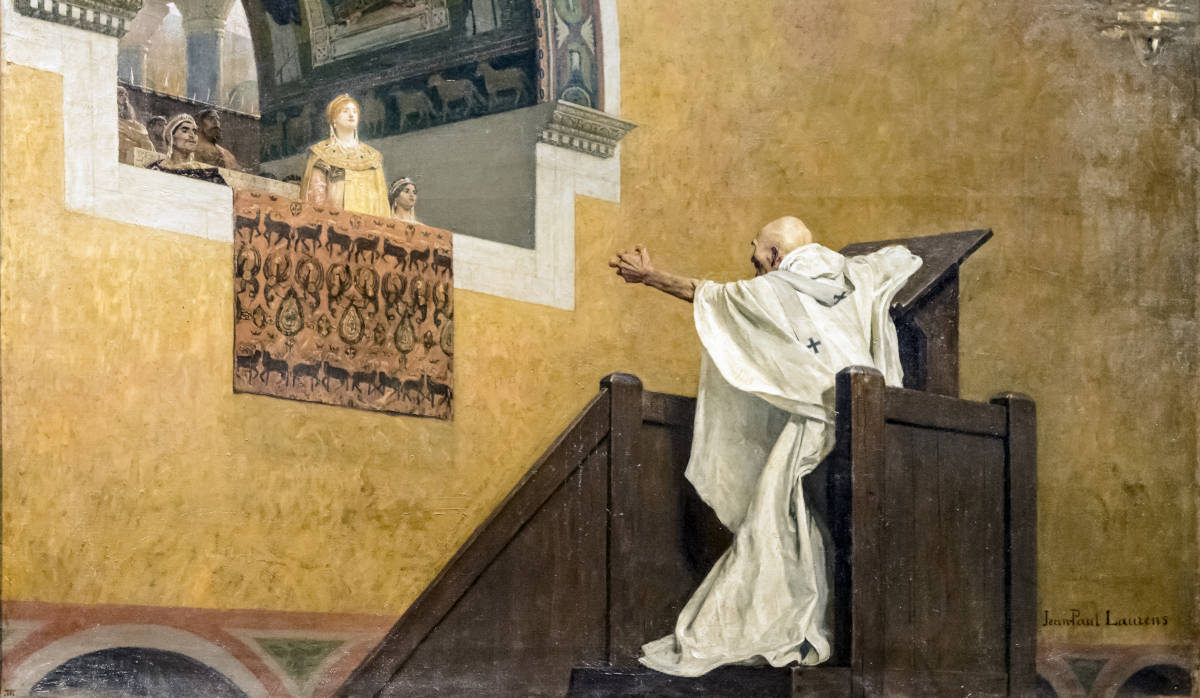
St. John Chrysostom
Saint John Chrysostom, Saint and Doctor of the Church was the Archbishop of Constantinople. He lived in the 4th century in Antioch and was raised by his mother, who saw to it that he was educated by the best – a pagan teacher named Libanius.
John was highly skilled as a writer, homilist, and public speaker. He would give eloquent discourses on the Christian life and passages from Scripture. As a prolific writer, he wrote hundreds and hundreds of homilies, influenced the Divine Liturgy, inspired musical compositions, and is quoted in 18 sections of the Catechism. His name “Chrysostom” means “golden-mouthed” in Greek.
On his deathbed, Libanius, his teacher, supposedly said, “he would have been my successor had the Christians not taken him from us.”
Through his ordination as deacon and then priest, he brought reconciliation between Antioch, Alexandria, and Rome – parts of the Christian world that had not been in communion in 70 years. Today, John is honored by the Catholic, Eastern Orthodox, and the Anglican Churches. He is also commemorated in some Lutheran Churches.
But John did not make everyone happy. Quite the contrary – he angered many because he challenged the people with the truth. He admonished Christians for embracing pagan celebrations, called for a reform of the clergy who were living in excess, and chastised the the rich for ignoring the poor.
He was banished from Constantinople several times in his life by the Empress who often felt that he was calling her out personally for her extravagance and excessive, lavish lifestyle. Even letters of protest and pleas from Pope Innocent I could not bring him back before his death in 407AD.
I think it is quite fitting that the church chose today’s Gospel as we celebrate the Memorial of St. John Chrysostom. St. Luke retells of Jesus’s blessings and woes to His disciples. This is a Gospel of social justice – addressing the real economic and social conditions of humanity.
It is a reminder to all of us that the most important thing we can do is to watch out for those who are less fortunate or weaker than ourselves – regardless of our state in life, our economic status, even our age. Not all poverty is financial – can we see Jesus in those whom we live with who may not be the most agreeable?
Can we be kind to those who care for us…. even when we may not feel like it, or when we think things aren’t done the way we like? Can we soften our hearts to those who may have forgotten us, cast us aside, or won’t look our way?
Not an easy task but one that, I believe Jesus and St. John Chrysostom is asking from all of us.
I came across a quote from St. John which I would like to leave you with:
“Do you wish to honour the body of Christ? Do not ignore him when he is naked. Do not pay him homage in the temple clad in silk, only then to neglect him outside where he is cold and ill-clad. He who said: “This is my body” is the same who said: “You saw me hungry and you gave me no food”, and “Whatever you did to the least of my brothers you did also to me”… What good is it if the Eucharistic table is overloaded with golden chalices when your brother is dying of hunger? Start by satisfying his hunger and then with what is left you may adorn the altar as well.”
What are your thoughts?